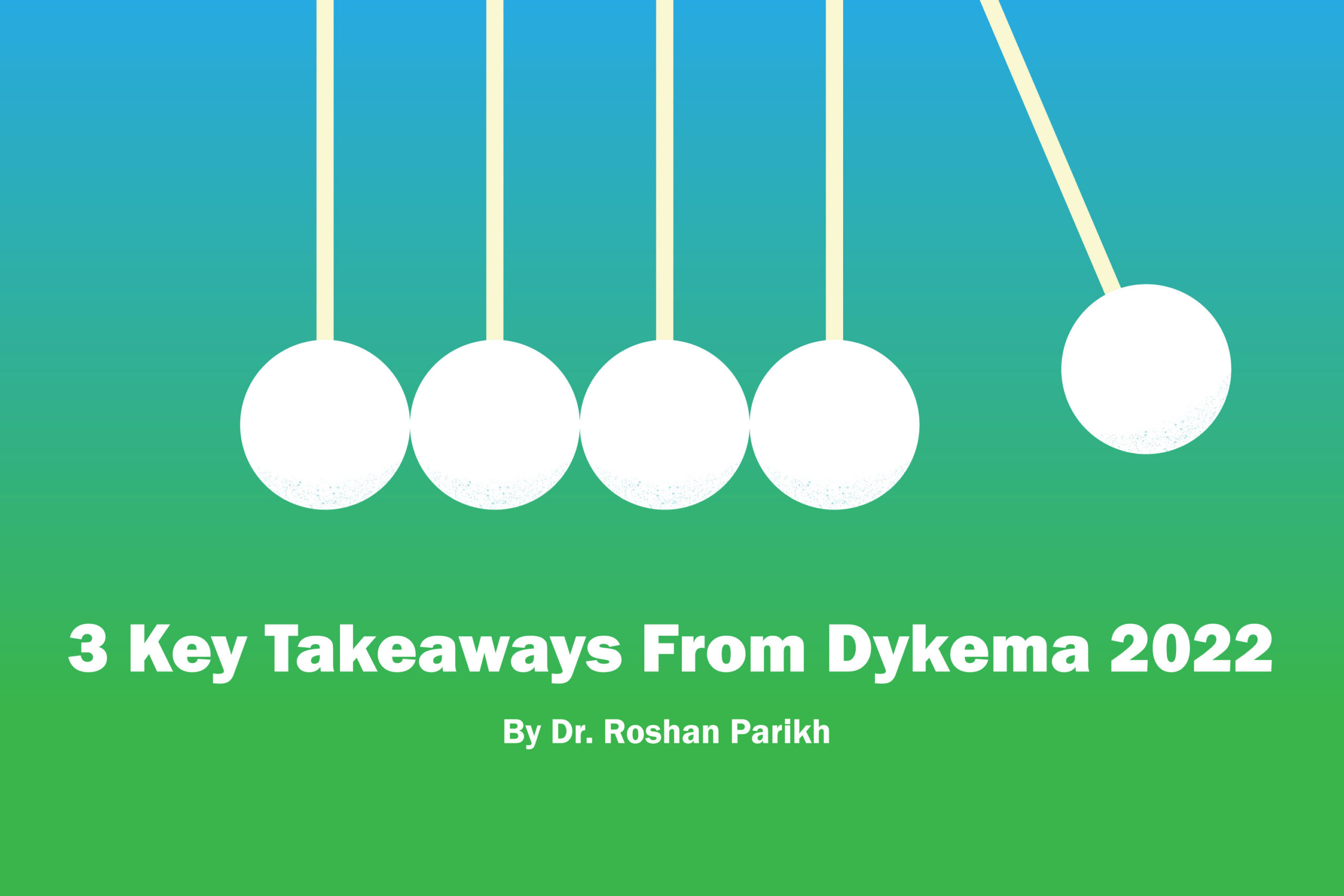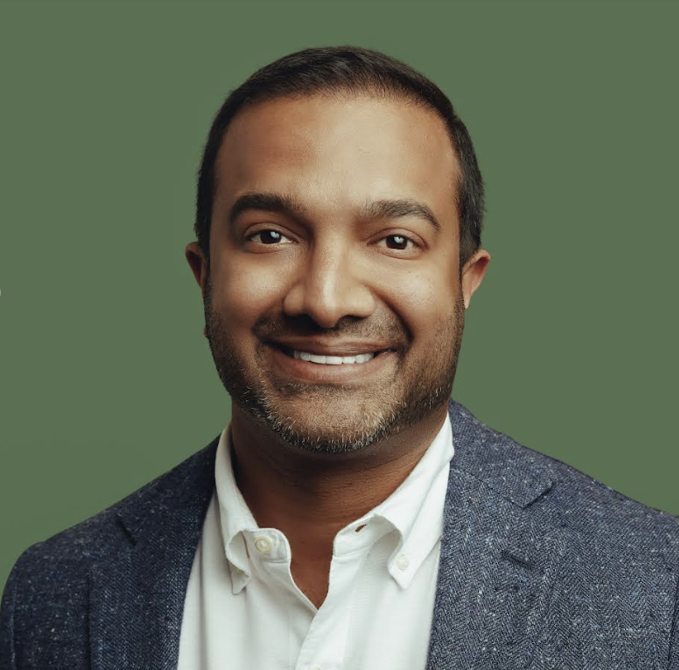3 Key Takeaways from Dykema 2022

Our industry has proven its resilience — but dental businesses can’t afford to stand still.
By Dr. Roshan Parikh, President and CEO, dntl bar
The dental business is evolving fast — and that makes it all the more important to step away from the daily grind now and then, and take a moment to reflect on all that’s happened to our industry over the last few years. That’s why I was so thrilled to head to the Gaylord Rockies Resort & Convention Center in Denver this month for Dykema 2022 — the undisputed heavyweight of dental gatherings — to learn from some of the brightest minds and biggest names in our industry.
There were plenty of fireworks (literally) as Dykema’s chief, Brian Colao, took the stage in front of a sell-out crowd of over 1700 attendees, and the adrenaline kept pumping as Olympic Gold medalist skier Lindsay Vonn and Michigan State basketball coach Tom Izzo gave keynote speeches highlighting the need for creative leadership in dentistry and beyond. It was also great to see the Women in DSO group continuing to thrive, and the DSO Difference Makers awards honoring (and steering much-needed funds) to nonprofits — a timely reminder that dental care should be guided by purpose and a drive to help others, not just the pursuit of profit.
As always, though, the real highlight of Dykema was the opportunity to listen to and learn from leading dental practitioners as they shared their learnings and spoke about the challenges they’ve faced, the solutions they’ve found, and the trends now shaping our industry. Here were three key takeaways from this year’s conference:
1) Dentistry is here to stay
Heidi Arndt, founder and CEO of Evolve Dental Advisors, made clear that the macroeconomic changes now affecting businesses of all kinds will impact the dental industry too. But while the economic indicators are bleak, dentists shouldn’t despair: we’ve seen time and again that the dental industry has the potential to be recession-proof, pandemic-proof, and resistant to all kinds of external shocks.
That doesn’t mean we can afford to get complacent, or to take our survival for granted. We need to remain sensitive to our patients’ economic pain, and to work to align our businesses with their needs. But it does mean we shouldn’t get swept up in panic over the state of the economy, or allow ourselves to give in to pessimism. Dentistry is here to stay, and the dental businesses that do best will be those that remain calm and optimistic, and keep on investing in the tools and talent they need in order to deliver amazing care for their patients.
2) Technological change won’t slow
Technological innovation is transforming dentistry — and while that might sometimes feel unsettling, the reality is that technological change will only accelerate in the months and years to come. Digitization will unlock new kinds of data-driven innovation, triggering a kind of snowball effect that will unlock powerful new tools and solutions for both patient care and back-end practice administration.
That’s good news — and as Scott Leune, founder of Breakaway Seminars, made clear, the even better news is that software-as-a-service (SaaS) models mean that practices and DSOs can increasingly tap into the latest and greatest innovations without breaking the bank. Subscription-based tech makes it easier than ever for dental businesses to offer cutting-edge services and to capture new efficiencies in order to boost profits, Scott explained. “There’s so much great tech out here — and you don’t have to be a billion-dollar DSO to rent the tech of those groups,” he said.
3) Investors want to see real value
The dental industry’s resilience and tech-forward ethos make it a prime candidate for outside investment. “Every time you invest in a doctor, it’s a win,” notes Bob Fontana, CEO of The Aspen Group. But the sector’s success is driving some investors to ask more probing questions of the businesses they’re acquiring. Pre-pandemic, it was common enough to see a private equity firm swoop in, bundle a few dozen practice locations into a single Dental Service Organization, then sell the newly consolidated business at a hefty profit.
Now, such financial engineering isn’t as common. Private equity still has a big role to play, and the DSO model is here to stay. But investors who’ve seen businesses unlocking new pathways to profitability will want to see more than just consolidation — they’ll want to see a real strategy for sustainable, tech-driven growth. Dentistry is still a great investment, but private equity groups will be more focused on fundamentals and future prospects before opening their wallets.
It’s morning for U.S. dentistry
Put those three trends together, and what do you have? I’d say you’ve got an industry that’s resilient and doubling down on the technologies that it needs to fuel growth, and that’s developing a more mature and sustainable relationship with investors. In coming months, I’d expect to see those three trends continue to drive our sector forward, and to bring practices and DSOs important new opportunities to strengthen their core businesses, serve their patients even better, and unlock new avenues for growth.
It might sound a bit strange to be so upbeat when the headlines are full of bad news about inflation, a tech downturn, and the possibility of an impending recession. But the reality is that the dental industry has proven that it’s capable of weathering economic storms. We’re providing an essential service — and if there’s one thing the pandemic showed us, it’s that during times of extreme stress, people need good dentistry more than ever.
That’s reassuring for dental professionals. But it’s also a reminder of our core obligation to the patients we serve. We’re privileged to work in an industry that thrives even during times of economic turmoil. We owe it to our patients — and our employees, our investors, and our business partners — to put our shoulders to the wheel, and keep doing our utmost to make our businesses the best they can be.
—-
 Dykema DSO guest blogger Dr. Roshan Parikh is a general dentist and a DSO influencer, who is regularly featured as a speaker at many different dental industry events. He was the former head of dentistry at Walmart Health and grew Walmart’s start-up dental services division to 30+ locations across 4 states. Dr. Parikh is currently President and CEO at a New York City based startup, dntl bar, with 5 current locations, that’s open 7 days a week.
Dykema DSO guest blogger Dr. Roshan Parikh is a general dentist and a DSO influencer, who is regularly featured as a speaker at many different dental industry events. He was the former head of dentistry at Walmart Health and grew Walmart’s start-up dental services division to 30+ locations across 4 states. Dr. Parikh is currently President and CEO at a New York City based startup, dntl bar, with 5 current locations, that’s open 7 days a week.
He also serves as a senior strategic advisor to tab32, an end-to-end cloud dental technology platform. He also serves as chief strategy officer of DSO Strategy, a consulting firm that helps entrepreneurial dentists develop sustainable growth plans and attract institutional capital.
